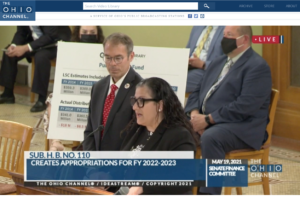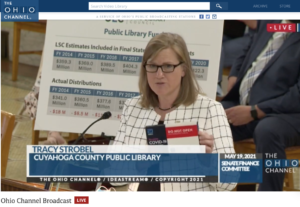OLC Testifies on State Budget Bill Before Ohio Senate Finance Committee

OLC’s Executive Director Michelle Francis and Jay Smith, OLC’s Director of Government and Legal Services explain the importance of library funding and maintaining the PLF at 1.7%.
On May 19, the OLC testified on Substitute House Bill (HB) 110, the biennial state budget bill, in front of the Ohio Senate Finance Committee and urged lawmakers to keep state funding levels stable for Ohio’s public libraries. OLC’s Executive Director Michelle Francis told lawmakers how public libraries stepped up during the pandemic to continue to meet the needs of their local communities. She also explained how libraries are able to leverage state dollars to make services, such as online educational courses from LinkedIn Learning available to Ohioans in every part of the state.
“Based on state and national data, we know that Ohio’s public libraries are extremely popular and in high demand with the highest use per capita in the nation,” Francis said. “We have the highest percentage of registered borrowers, highest number of visits, and highest circulation. Libraries are open to all and a resource that Ohio’s citizens increasingly turn to for vital services. Our success is dependent on the strong partnership between the state and the local library systems.”
Francis provided specific examples of what libraries did when the pandemic started and what they continue to do today, such as expanding internet access, loaning WiFi hotspots, increasing digital collections and services, and offering curbside pick up.
“Public library services are essential to the communities we serve. This was already evident pre-pandemic and became even more profound over the past year, ” Francis said. “As we come out of the pandemic, Ohio’s public libraries will be here to work with our schools to address the pandemic educational gaps we are seeing in Pre-K and Kindergarten as well as minority populations and economically disadvantaged communities. We will be here to assist in workforce development efforts to help displaced workers take online courses and apply for employment. We will still be here providing programming and lifelong learning opportunities for all ages. However, to continue these efforts, we will need resources.”
Jay Smith, OLC’s Director of Government and Legal Services thanked the Ohio Senate members for their work over the last three budget cycles to begin to restore state funding to Ohio’s public libraries through the Public Library Fund (PLF). He told the committee that those efforts are now in jeopardy under the current budget proposal.
“The House version of HB 110 would reduce state funding to Ohio’s public libraries from 1.7% to 1.66% of the state’s General Revenue Fund,” Smith said. “In fact, our funding has not been set at this reduced rate since Fiscal Year 2015.”
Smith explained that the PLF is not a line-item appropriation like other programs and state agencies in HB 110. It is in permanent law and is a set percentage of the state’s monthly tax receipts that go into the General Revenue Fund (GRF). He described how the PLF ebbs and flows each month depending on state revenues and that it is currently set in temporary law at 1.7% of the GRF for FY 2021.
“State funding through the PLF is critically important because it remains a primary source of revenue for public libraries,” Smith said. “Statewide, more than 48% of the total funding for Ohio’s public libraries comes from the state through the PLF. In addition, 20% of Ohio’s public library systems (50 of 251) do not have a local property tax levy and rely solely on their state funding as their main source of revenue for day-to-day operations.”
Smith explained that state funding for Ohio’s 251 public library systems will be reduced unless the budget is amended to keep PLF funding at current levels. He also addressed misleading reports about millions of federal dollars going directly to public libraries in Ohio.
“In recent weeks we have been receiving questions related to federal funding,” Smith said. “Let me be clear, Ohio’s public libraries are not receiving $170 million in federal funding through the American Rescue Plan (ARP).”
Smith described that instead, about $200 million will go to libraries nationwide through the federal Institute of Museum and Library Services (IMLS). Of that amount, the State Library of Ohio will receive $4.5 million to divide among university academic libraries, K-12 school libraries, prison libraries, and public libraries.
Smith urged members of the Ohio Senate to keep the PLF at the current (FY21) rate of 1.7% because there are still several unknowns regarding Ohio’s economy and the budget process between now and June 30 that could impact the state’s GRF base and ultimately reduce the PLF. He also explained that libraries are facing increasing costs right now.
“In 2020, public libraries saw a 33% increase in digital book circulation over 2019,” Smith said. “This significantly impacts budgets because of the increased costs associated with eBooks.”
Smith described how libraries pay nearly five times the consumer price for an eBook and that publishers also charge libraries to renew the license in 24 months. He referenced an example during his testimony that showed library pricing for a popular eBook. That graphic is available on the OLC website.
“Investing in public libraries is critical as the usage and demand for our services is growing and broadening – especially as we assist in Ohio’s recovery efforts, ” Smith said. “None of the services Michelle mentioned earlier would be possible without our state funding. Making public libraries a priority in this budget and maintaining the PLF at 1.7% is a step in the right direction.”

Cuyahoga County Public Library Executive Director Tracy Strobel shows the committee the COVID-19 at-home testing kit that patrons can pick up from the library.
The Senate Finance Committee also heard from Tracy Strobel, Executive Director of the Cuyahoga County Public Library. She explained how the reduction in the PLF from 1.7% to 1.66% of the GRF would amount to a $2.1 million loss for the two largest library systems in Greater Cleveland and closer to $22 million for libraries statewide.
“This is not the time to decrease the Public Library Fund,” Strobel said. “As Ohioans come out of the COVID-19 pandemic, their needs around workforce development, support for K-12 students, and long-term solutions to the digital divide are only set to grow. Our public libraries are well positioned to support the job seekers, students, families, and seniors whose lives have been most impacted by the pandemic.”
Strobel told the committee that public libraries maintain widespread trust and support, and asked the committee to consider how the cut in funding would impact public libraries and the communities that rely on them.
“As we have spent the past year “social distancing” to keep one another safe, we must now turn to places like public libraries to help rebuild that important social infrastructure that keeps neighbors, families and communities connected to one another,” Strobel said.
A recording and transcript of the testimony is available at libraryfunding.olc.org.


